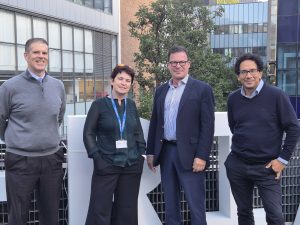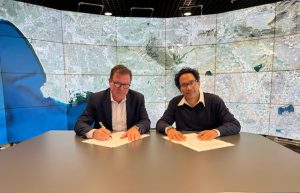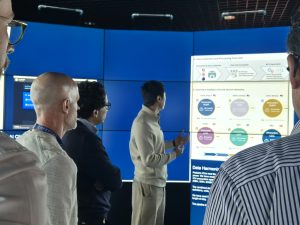
We were delighted to welcome our partners Prof. Terry Sanger, Vice President for Research and Chief Scientific Officer and Dr Robert Kelly, Medical Director, CVICU and Director of Research and Academics of the Children’s Hospital of Orange County (CHOC Children’s), part of Rady Children’s Health at our Imperial College London campus this week. Over the past few years, the partnership between Imperial’s Prof. Aldo Faisal‘s and Prof. Padmanabhan Ramnarayan and the CHOC team has been developing a paediatric version of the AI Clinician technology to provide faster and more accurate treatment recommendations for critically ill children.
Terry and Robert were also welcomed on campus by Imperial’s Vice-Provost (Research and Enterprise) Professor Mary Ryan. The culmination of the two day campus and hospital visit was the signing of an agreement for the two institutions to boost their existing partnership focussed on developing artificial intelligence (AI) for paediatric healthcare. The partnership has already combined 36,000 anonymised records from CHOC with 20,000 anonymised NHS patient records to create the largest international paediatric dataset of its kind.

Prof. Terry Sanger said: “It can be very hard to understand how doctors think as we doctors have a very different thought process to engineers, or mathematicians, or scientists because we are decision-based – what is the next best step for our patient with the knowledge and tools we have? What I love about working with Prof Aldo Faisal and his AI4Health Centres here at Imperial is that they have a multi-disciplinary team that embeds clinicians alongside data scientists and computer engineers. Together they have gone to a tremendous effort to understand in great depth and with great sensitivity the way in which doctors deliver care to their patients, so they really understand the environment in which AI tools such as the AI Clinician and Nightingale AI will be applied and can tailor the tools accordingly. It’s a very exciting initiative to collaborate on and has great potential to support doctors like me to deliver the best care possible.”
Dr Robert Kelly said: “On this two day visit I’ve been struck by how experienced the entire Imperial team is and how much time and effort has been put into the granular nature of this work which makes these tools incredibly robust and useful for clinicians. What we’ve been shown today takes many, many hours of concentrated and dedicated work. They’re very focussed on making these innovations useful for clinicians and that’s where I see my contribution on behalf of CHOC, I can give insight into how these tools could best support me at the bedside when I want to make the best decisions for my patients and their families.”
Prof. Aldo Faisal, Director of the AI for Healthcare Centres (AI4Health) and Co-Director of Imperial’s School of Human and Artificial Intelligence, said: “AI is a rapidly developing tool that has proven to be valuable across all areas of scientific research but there is a a particular

and urgent need to design and develop AI models that are tailored specifically for the medical field. We are pioneering a global not-for-profit effort to develop the world’s largest healthcare foundation model Nightingale AI, which is designed to leverage vast repositories of electronic patient records, biomedical data, and published medical literature to develop an advanced health-focused AI model. CHOC joining this effort is an absolute game changer and puts the often overlooked care of children at the forefront for the best medical AI.
“While the UK’s health system and data integration puts us in a unique position to lead globally in AI in healthcare science and innovation. The gold-standard for developing and evaluating patient-ready AI technology are multi-centre international trials. This strong UK and US partnership enables us to improve children health globally by building AIs that learn from a much broader range of conditions and medical backgrounds.”